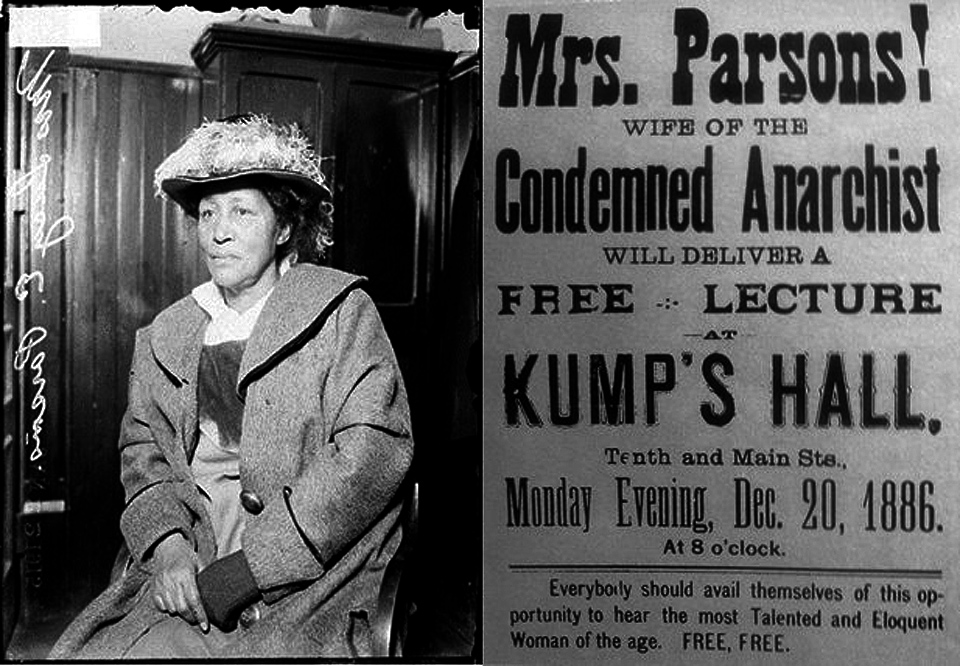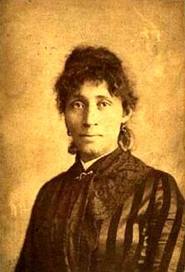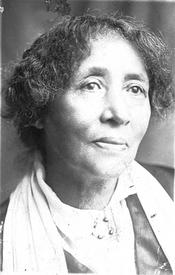
Lucy Ella Gonzales Parsons, a working-class leader and spouse of one of the Haymarket martyrs, died March 7, 1942 in Chicago.

Lucy Ella Gonzales was born in Texas in 1853 of African-American, Mexican and Native-American ancestry. She worked for the Freedmen’s Bureau after the Civil War. She married Albert Parsons and both fought for African-American voting rights and against the KKK lynch terror. Threats forced them to flee Texas and they settled in Chicago in 1873 where Lucy became a dressmaker and an early organizer of the garment workers’ union. Albert worked for a newspaper until his union activities led to his dismissal.
Albert Parsons was one of eight labor leaders framed and tried for the Haymarket bombing, which is generally attributed to a police provocateur. Albert Parsons wasn’t even present at Haymarket, but was caring for the couple’s two children while Lucy Parsons was organizing a meeting of garment workers. After the Haymarket frame-up, Lucy led the campaign to free her husband.
The late labor history scholar Bill Adelman wrote what is the definitive story of Haymarket. Read it here at the Illinois Labor History Society website.
A paragraph from his description indicates the significance of the event and the horrors that all involved endured:
“The next day martial law was declared, not just in Chicago but throughout the nation. Anti-labor governments around the world used the Chicago incident to crush local union movements. In Chicago, labor leaders were rounded up, houses were entered without search warrants and union newspapers were closed down. Eventually eight men, representing a cross section of the labor movement were selected to be tried. Among them were (Albert) Parsons and a young carpenter named Louis Lingg, who was accused of throwing the bomb. Lingg had witnesses to prove he was over a mile away at the time. The two-month-long trial ranks as one of the most notorious in American history. The Chicago Tribune even offered to pay money to the jury if it found the eight men guilty.”
Albert Parson was one of eight who were convicted and one of four hanged on November 11, 1887. In June of 1893, Illinois Governor John P. Altgeld pardoned the 3 men still alive and condemned the entire judicial system that had allowed this injustice. They are honored with a monument at Waldheim Cemetery, which Lucy Parsons led the fight to erect. (Her grave is located a few feet from the monument.)

Lucy Parsons spent her life fighting for worker’s rights, civil liberties and against racism while raising their children after her husband’s execution. Her politics have been variously described as radical, socialist, anarchist and communist. She became involved in the International Labor Defense, fought for the freedom of Sacco and Vanzetti, Tom Mooney and the Scottsboro Nine.
She led many demonstrations of the unemployed, homeless and hungry, including a memorable 1915 Poor People’s March of the Unemployed of over 15,000 people in Chicago on January 17, 1915, where “Solidarity Forever” was sung for the first time. IWW songwriter Ralph Chaplin had finished writing “Solidarity Forever” two days prior. Marchers demanded relief from hunger and high levels of unemployment.
The demonstration also persuaded the American Federation of Labor, the Jane Addams’ Hull House, and the Socialist Party to participate in a subsequent, huge demonstration on February 12, 1915
For years Lucy Parsons was harassed by the Chicago Police Department, who often arrested her on phony charges to prevent her from speaking at mass meetings. Following her death in a suspicious fire at her home, the police and FBI confiscated all her personal papers and writings. But her fighting spirit and contributions to making this a better world will not be forgotten.
Photo: Lucy Parsons, 1886, public domain.

MOST POPULAR TODAY


Zionist organizations leading campaign to stop ceasefire resolutions in D.C. area

Communist Karol Cariola elected president of Chile’s legislature

Afghanistan’s socialist years: The promising future killed off by U.S. imperialism

High Court essentially bans demonstrations, freedom of assembly in Deep South






Comments